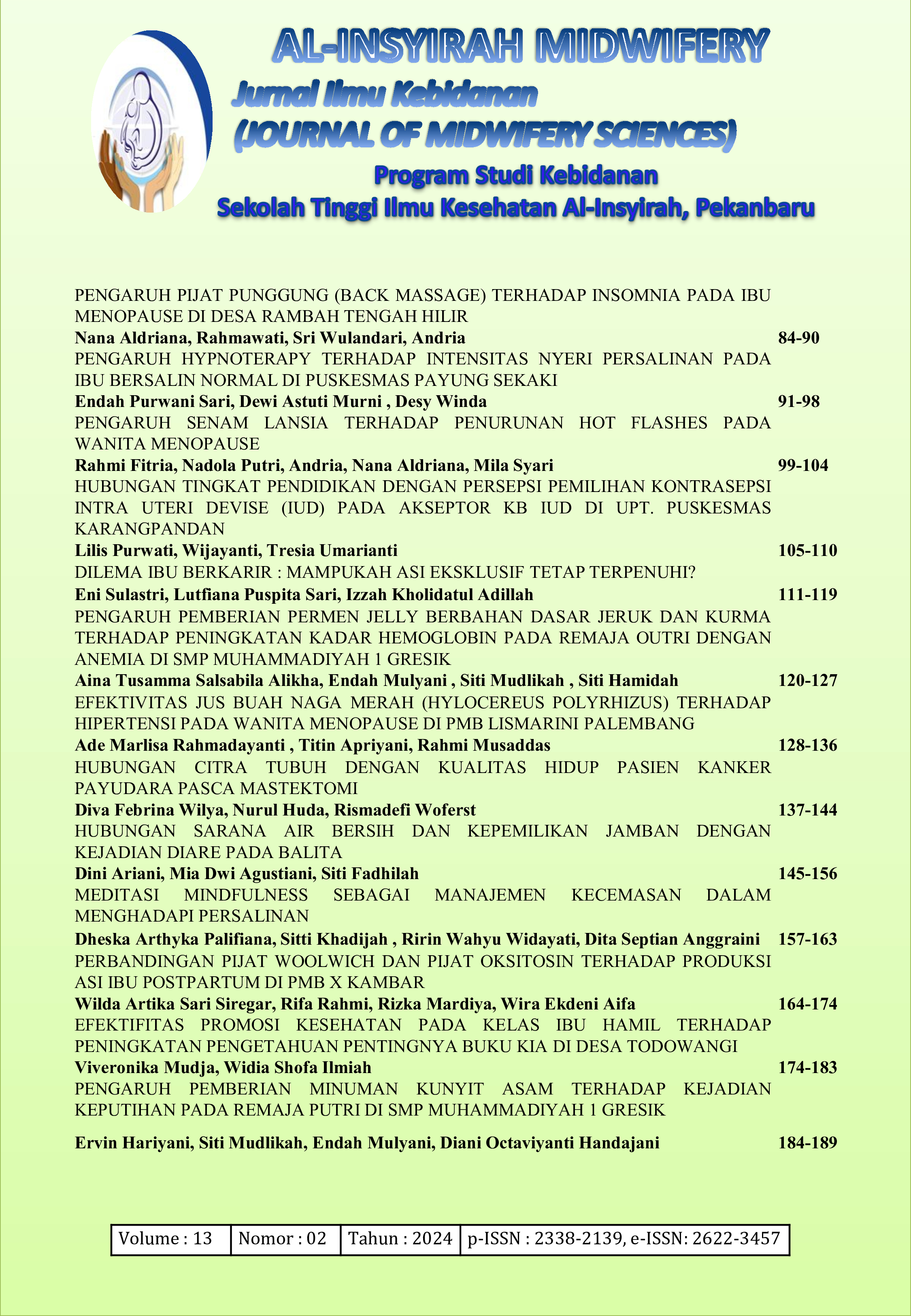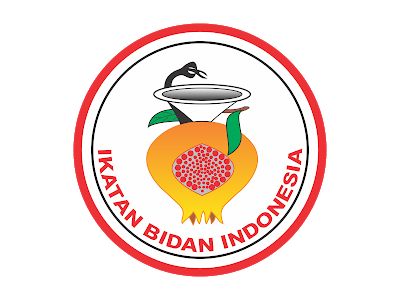HUBUNGAN TINGKAT PENDIDIKAN DENGAN PERSEPSI PEMILIHAN KONTRASEPSI INTRA UTERI DEVISE (IUD) PADA AKSEPTOR KB IUD DI UPT. PUSKESMAS KARANGPANDAN
DOI:
https://doi.org/10.35328/kebidanan.v13i2.2686Keywords:
Educational, Perception, IUDAbstract
Education will influence a person's attitude in making decisions because the higher the level of education, the more rational they will be in making decisions, this will also apply in decision making to choose an appropriate, precise and effective contraceptive method. So, with education, it is hoped that it will be able to improve a person's perception and behavior regarding lifestyle, especially in motivating them to use contraception to help participate in realizing the family planning movement. This research uses quantitative research methods with a cross-sectional approach. The population in this study was 1,657 IUD acceptors. The sampling technique that will be used is the Purposive Sampling technique. The sample size was 10% of 1,657 acceptors, totaling 170 acceptors. The instrument used was a questionnaire of perceptions of choosing the type of IUD contraception. The Chi Square statistical test results the Asymp value. Sig. (2-sided) 0.000 < 0.05, meaning that Ha is accepted, and Ho is rejected, so there is a relationship between education level and the perception of IUD contraceptive choice among IUD contraceptive acceptors at Community Health Centers of Karangpandan
Downloads
References
Ahdar, S. 2021. Ilmu Pendidikan. Sulawesi Selatan:IAIN Parepare Nusantara Press.
Alizamar, Nasbahry Couto. 2016. Psikologi Persepsi dan Desain Informasi. Yogyakarta:Media Akademi
Arikunto, S. (2020) Prosedur Penelitian: Suatu Pendekatan Praktik. 18th edn. Jakarta: Rineka Cipta.
Asnori. 2020. Psikologi Pendidikan Pendekatan Multidisipliner (Fajar T. Septiono (Ed.); 1 st Ed.). CV. Pena Persada.
BKKBN. 2021. Pedoman Pelayanan Kontrasepsi dan Keluarga Berencana. Jakarta:Kementrian Kesehatan RI
BKKBN. 2015. Pedoman Pelayanan Kontrasepsi dan Keluarga Berencana. Jakarta:Kementrian Kesehatan RI
BKKBN. 2013. Pedoman Pelayanan Kontrasepsi dan Keluarga Berencana. Jakarta:Kementrian Kesehatan RI
Bombing, Y, C. (2019). Hubungan Nilai Budaya Dan Persepsi Akseptor Dengan Minat Dalam Pemilihan Alat Kontrasepsi IUD Di Puskesmas Ambarawa Kabupaten Semarang. 1-13.
Dalimawaty dan Julina Br Sembiring. 2020. Faktor yang Mempengaruhi Minat Ibu Menggunakan KB IUD di Puskesmas Binjai Estate, Jurnal Ilmiah Kebidanan Indonesia, Vol.10. No.3, September 2020.
Diana, S. 2017. Model Asuhan Kebidanan Contiunity of Care. Surakarta:CV Kekata Group
Gunawan, Surya. 2010. Mau Anak Laki-laki atau Perempuan Bisa diatur. Jakarta : Argomedia Pustaka
Hartanto, H.2004. KB dan Kontrasepsi.Pustaka Sinar Harapan. Jakarta
Hikmawati, Fenti. 2017. Metodologi Penelitian. Depok:Rajawali Press
Maula, Aminatul. 2014. Faktor-Faktor Yang Berhubungan Dengan Pemilihan Kontrasepsi Pada Akseptor KB Wanita Di Tuwel.
Mosher,W.D.,Moreau, C.,& Lantos, H. (2016). Trends and determinants of IUD use in the USA, 2002–2012. Human Reproduction, 31(8), 1696–1702. https://doi.org/10.1093/ humrep/dew117
Mukaffan. 2022. Pengembangan Sumber Daya Manusia dalam Kepemimpinan Pendidikan Islam. Lumajang:Klik Media
Natalia, Mega Silvian. 2019. Hubungan Tingkat Pendidikan PUS dengan Pemilihan Alat Kontrasepsi di Desa Karangbong. Probolinggo, 2014
Notoatmodjo. (2015). Metodologi Penelitian Kesehatan. Jakarta : Rineka cipta.
. (2017). Pendidikan dan Perilaku Kesehatan. Rineka Cipta.
Oktarani, Rani. 2022. Hubungan Pendidikan dan Pengetahuan Ibu Terhadap Pemilihan Kontrasepsi IUD (Intra Uterin Device) Jurnal STIKES Al-Ma’arif Baturaja Vol.7 No. 1, April 2022. Sulawesi Tenggara 2022
Purnia, Dini Silvi, dkk. 2022. Metodologi Penelitian. Banyumas:CV. Pena Persada
Rahmat Hidayat dan Abdullah. 2019. Ilmu Pendidikan “Konsep, Teori dan Aplikasinya”. Medan:Lembaga Peduli Pengembangan Pendidikan Indonesia (LPPPI)
Rohaeni E, Iis. Faktor-Faktor yang Mempengaruhi Penyebab Rendahnya Penggunaan Alat Kontrasepsi Dalam Rahim (AKDR). J Ilm Indones.2020;5(12):1549sd65
Rohmah HNF, Sari WW. Minat Pasangan Usia Subur Memakai Alat Kontrasepsi Dalam Rahim. Inst Med DrgSuherman. 2019;3(2):47–51. https://ejurnal.stikesmhk.ac.id/
Sahir, Syafrida Hafni. 2022. Metodologi Penelitian. Yogyakarta:Penerbit KBM Indonesia.
Sugiyono. 2017. Metode Penelitian Kuantitatif, Kualitatif, dan R&D. Bandung : Alfabeta.
Surahman, dkk. 2016. Metodelogi Penelitian. Jakarta:Kemenkes RI.
Utami, Fitriana Putri, dkk. 2018. Buku Ajar Keluarga Berencana dan Kontrasepsi. Yogyakarta: CV. Pustaka Ilmu Group.
Veronica SY, Safitri R, Rohani S.(2019). Faktor - Faktor Yang Berhubungan Dengan Pemakaian KB IUD Pada Wanita Usia Subur. Wellness Heal Mag . 2019;1(2):22330.
Downloads
Published
Issue
Section
License
Copyright (c) 2024 Al-Insyirah Midwifery: Jurnal Ilmu Kebidanan (Journal of Midwifery Sciences)

This work is licensed under a Creative Commons Attribution 4.0 International License.














